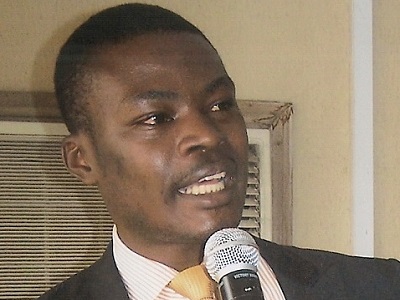E-Business
Resourcery Partners Cisoco on Video Tool Seminar

Resourcery Plc., a leading system integrator in Nigeria in partnership with Cisco Systems International is organising a one day business seminar tagged “Video as tool for corporate communication and productivity”.
The event is aimed at showcasing development in both one-way and two-way video solution and how well this can be employed within the corporate arena for improved business benefits.
The event is targeted at key decision makers in marketing, corporate communication and human resource departments of medium to large organizations in Nigeria. This was disclosed at a media parley which took place at the corporate head office of Resourcery recently.
Speaking from Abuja via video, Mr. Olugbenga Adanlawo, business solution manager (Voice and Video Solution) for Resourcery noted that the global use of video to aid productivity and communication has been on the ascendancy within the corporate environment for some time now and the Nigeria business environment is beginning to enter that developmental phase as well.
This he said necessitated the need to bring together the people who may be the biggest users of the video solution in large to medium scale organizations.
Adanlawo said; “This business session provides an important opportunity for our invited guest to see the practical demonstration of howVideo solution can be deployed as an effective Corporate Communications and Human Resource management tool. It would also provide a real life in-sight into how video can be a cost saving innovation as well as an efficient in-person experience for face-to-face meetings.”
He however noted that; “the real benefit is staff productivity improvement.” This he illustrated by saying; “for instance, instead of an employee spending an entire work day travelling to and from Abuja/Port Harcourt for a two-hour meeting, the employee can have a productive ‘face to face’ meetings with the person in Abuja or Port-Harcourt within the confines of her office in Lagos. Which means valuable travel time (which actually translates to work time) is saved and employee productivity level increases. This is only achievable if video solution is deployed by the employee’s organization.”
Also speaking on the importance of the event to invited guest, Mrs. Angela Chike-Dike, senior manager (Business Development) noted that Hiring processes can be very lengthy and costly, especially when candidates are located in other cities or when multiple people are involved in the interview process.
But organizations with video conferencing systems in their offices can reduce expenses and time by bringing candidates into the nearest facility and allowing interviews to be conducted both in person and over video.
Such interview session she noted can also be recorded thereby enabling persons unable to bge part of the live interview process to see and evaluate candidates over video.
She noted that; “Video conferencing can be used to achieve significant benefits beyond increased productivity and reduced costs. Other important benefits are the reduced downtime and increased quality of life for travelling personnel as well as reduced hiring cycles for key employees.”
Chike-Dike then summed it by saying; “Even local manufacturing organizations can use video conferencing and content sharing to verify product quality, make revisions, and ensure accuracy throughout the supply chain. All these can be achieved while the competition is left behind to rely on next-day delivery of services.”
Founded in 1985, Resourcery provides end-to-end business solutions to its customers across the West African market. The company offers business solutions that cut across Enterprise Network Infrastructure, Business Voice & Video Solutions, Data Security and Business Intelligence Solutions amongst others.
E-Business
NITDA DG Reaffirms FG Commitment to Responsible and Inclusive AI

The Federal Government of Nigeria has reaffirmed its commitment to building a responsible, inclusive, and sovereign artificial intelligence ecosystem to enable Nigeria to transition from being a passive consumer of AI technologies to an architect and builder of indigenous AI systems.

This was said by the Director General of the National Information Technology Development Agency (NITDA), Kashifu Inuwa Abdullahi CCIE, while delivering a virtual address at the InnovateAI Conference held in Lagos.
The conference brought together policymakers, technology leaders, innovators, and stakeholders to discuss the future of artificial intelligence and its role in driving Nigeria’s digital economy and national development agenda.
Inuwa outlined Nigeria’s ambition to transition from being a consumer of artificial intelligence technologies to becoming a builder and owner of AI systems that reflect national values and priorities, in line with the National AI Strategy.
“Our goal is not just to use AI, but to architect and build our own AI systems in Nigeria,” he said, stressing that the country must take ownership of its AI future.
He noted that Nigeria’s approach to artificial intelligence extends beyond innovation to include governance, infrastructure, data sovereignty, and policy evolution.
According to him, “Responsible AI is never a finished job; it is an iterative journey. Our policies must evolve as the technology evolves, and we must avoid frozen laws by adopting living policies that adapt over time.”
He cited the implementation of the Digital Economy and E-Governance Bill as a key mechanism for generating insights that will help refine AI regulations and governance frameworks.
Inuwa also highlighted the challenge of data representation in global AI systems, noting that most models are trained on non-African datasets, which often results in bias against local dialects, cultures, and demographics.
“If a model shows bias against a local dialect or demographic, we cannot just patch it. We must reinvest in infrastructure to retrain it with inclusive and representative local datasets,” he stated.
He added that building national AI infrastructure is critical to achieving data sovereignty and ensuring that Nigeria is not merely an end user of foreign AI systems.
He further called for strategic partnerships with global technology companies and hyperscalers to build AI infrastructure in Nigeria while aligning with local values and national priorities.
“The world today is a global village. We need to work with global players, but they must understand our local nuances and help us build the infrastructure to retrain and develop AI models that reflect our context,” he said.
The NITDA Director General explained that adopting a comprehensive AI lifecycle approach, from responsible data collection and governance to deployment and continuous feedback, will enable Nigeria to move from reacting to AI developments to proactively designing indigenous AI systems.
“Without understanding how AI models are trained, how decisions are made, and how models are retrained, it will be difficult to build a responsible and trustworthy AI system,” he warned.
He reaffirmed that the Federal Government is intentional about promoting responsible AI and is working closely with the technology ecosystem to co-design national AI guardrails. He described platforms such as the InnovateAI Conference and other national AI dialogues as critical to shaping Nigeria’s AI future.
E-Business
Mutual Benefits Assurance Settles ₦5.9bn Claims in January 2026

Mutual Benefits Assurance, a leading Nigerian insurance company, has paid a total of ₦5,937,665,353.57 in claims to policyholders in January 2026 alone, underlining its strong financial capacity and unwavering commitment to prompt claims settlement.

Mutual Benefits Assurance
A breakdown of the figures shows that ₦3,426,602,834.28 was paid under its General (Non-Life) Insurance portfolio, while ₦2,511,062,519.29 was paid across its Life businesses, including Group Life and Retail Life policies.
The significant payout within a single month reinforces Mutual Benefits’ reputation as a dependable insurer that honors its obligations swiftly and responsibly.
Commenting on the development, Olufemi Asenuga, Managing Director, Mutual Benefits Assurance Plc stated that claims settlement remains the core promise of insurance and the ultimate test of an insurer’s credibility.
“Insurance is built on trust. Our ability to settle over ₦5.9 billion in claims in one month demonstrates not only our financial strength, but also our deep commitment to our policyholders. At Mutual Benefits, we do not just sell policies. We stand by our promises,” he said.
With over three decades of operations, Mutual Benefits has consistently positioned itself as a strong and well-capitalised insurer.
The company operates both Life and General Insurance businesses and remains fully compliant with regulatory capital requirements as stipulated by the National Insurance Commission (NAICOM).
The January payout reflects Mutual Benefit’s robust underwriting standards, prudent risk management practices and efficient claims administration framework.
It also aligns with the company’s broader record of substantial claims settlement in recent years, reinforcing its standing as a trusted brand in the Nigerian insurance industry.
Mutual Benefits employs over 5,000 staff, managed by seasoned management team and an experienced Board of Directors. Industry observers note that prompt claims payment remains one of the most critical differentiators in Nigeria’s competitive insurance landscape.
By consistently settling valid claims without delay, Mutual Benefits continues to strengthen customer confidence, deepen market trust and expand its footprint across retail and corporate segments.
As the company begins 2026 on a strong footing, it reiterates its commitment to innovation, service excellence and delivering value to policyholders and stakeholders alike. Mutual Benefits Assurance focused on its mission to provide reliable risk protection solutions while maintaining the highest standards of professionalism and integrity.
E-Business
NITDA Warns Nigerians of Actively Exploited Microsoft Office Vulnerability

National Information Technology Development Agency (NITDA) has issued an urgent cybersecurity warning about a serious Microsoft Office vulnerability (CVE-2026-21509) that attackers are actively exploiting.

This advisory, shared through Nigeria’s Computer Emergency Response Team (CERRT.NG), highlights the risks of this flaw and recommends immediate action to protect systems.
Microsoft has released quick security updates to fix this vulnerability, which has a severity score of 7.8, showing it is a serious risk. Attackers have already used it in targeted attacks.
CVE-2026-21509 affects multiple versions of Microsoft Office, including Office 2016, Office 2019, Microsoft 365 Apps, Office 2021, and later versions.
This flaw allows attackers to bypass security features meant to stop harmful Object Linking and Embedding (OLE) controls. OLE is an older Microsoft technology that can be used to embed links or content, but it has often been exploited by malware.
By exploiting this flaw, attackers can create specially designed Office documents.
When a user opens these documents, they can run malicious code or gain further access to the system.
Exploitation requires user interaction, meaning attackers often trick people into opening harmful Word, Excel, or other Office documents. Common methods include using email attachments or files from untrusted sources.
Because Microsoft confirmed that the vulnerability is being actively exploited, they have made emergency security updates available outside their usual schedule. Users and organisations should:
- Install the latest Microsoft Office security updates for all affected versions.
- Restart Office applications for Office 2021 and later to ensure that the updates take effect.
- Use registry-based settings for protection if updates can’t be applied right away.
- Follow good cybersecurity practices, like using endpoint protection and filtering emails.
Microsoft’s updates for Office 2021 and newer versions are automatically applied, but need a restart of the applications to be active.

 Telecom3 days ago
Telecom3 days agoBanks, Telcos Settle Four-Year Dispute over N300Bn USSD Debt

 General News2 days ago
General News2 days agoHow JustMarkets Is Empowering African Traders with Global Market Access

 Telecom2 days ago
Telecom2 days agoGroup Condemns Gabon’s Social Media Shutdown Amid Protests

 E-Financial2 days ago
E-Financial2 days agoACAMB Educates Content Creator to Curb Misinformation on Bank Recapitalisation

 General News3 days ago
General News3 days agoPalmPay Unveils First Batch of Winners in #LoveWithPalmPay Campaign

 E-Business2 days ago
E-Business2 days agoMutual Benefits Assurance Settles ₦5.9bn Claims in January 2026

 E-Financial3 days ago
E-Financial3 days agoFirstCap MD says Payment Security Remains Biggest Barrier to Bankable Gas and Power Projects

 Telecom2 days ago
Telecom2 days agoIXPN Positions as the Regional Internet Exchange Hub for West Africa






















